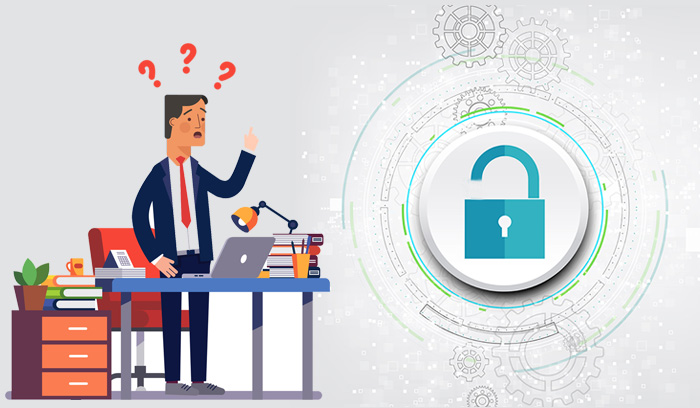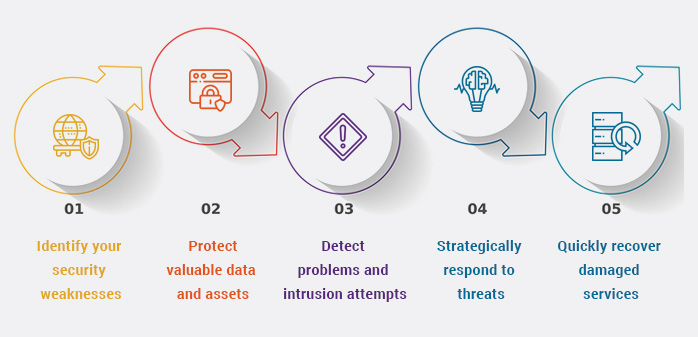IT Consulting & StrategySecurityConstructionEducationFinanceHealthcareLegalReal Estate
Because it’s so complicated, cybersecurity is a difficult topic for small and midsized businesses to engage in. There are many things that go into good cybersecurity, like malware protection, network, and server security, application security, and the management of mobile and IoT devices. For small and midsized companies that don’t have access to an in-house cybersecurity team, this complexity can easily become overwhelming.

Another of the major reasons that it’s hard for SMBs to get a grasp on cybersecurity is that there is a lot of conflicting, outdated, and inaccurate information surrounding the topic. While Google can be a great resource for basic research, it fails to provide in-depth information, and very often leads people in entirely the wrong direction.
Without a true sense of what a strong cybersecurity solution does and doesn’t entail, most businesses will suffer. Let’s look at some of the most common cybersecurity myths and set the record straight.
Myth 1: Cybersecurity is Only Necessary for Large Companies
With the nation’s attention on large-scale hacks, it’s easy to fall into the trap of thinking that hackers are only targeting major corporations. But those spectacular attacks, like the Equifax breach, the Yahoo attacks, or the Sony Pictures hack, are just the tip of the iceberg.
The reality is that you don’t hear about the thousands of smaller cyberattacks that happen every year, because either the companies are too small to make the news, or else the organization getting hacked doesn’t want to admit that they’ve been compromised. Here are the facts:
- Small businesses are the victim in the majority of cyberattacks (58%), according to Verizon’s Data Breach Investigations report.
- The Ponemon Institute has found that two-thirds of small businesses have experienced a cyberattack in the last twelve months.
- The same study from the Ponemon Institute found that three-quarters of small businesses don’t have the cybersecurity personnel to address their security gaps.
In many cases, small and midsized businesses might not even know that they’ve been attacked. According to ZDNet, it takes an average of 6 months for the average business, even to realize that it’s been infiltrated. Think about how much damage a hacker can do in just a few hours, and then calculate that out over the many months they could be inside your IT systems undetected.
Myth 2: Cybersecurity Takes a Huge Budget to Address Properly
Another common myth that keeps small businesses from really addressing their IT security is a false notion that it must always involve a large expenditure. There are a few reasons why small and midsized businesses think this way.
The most important is that hiring cybersecurity talent in-house is indeed very expensive. For example, the average salary for a cybersecurity engineer in the NYC area is well over 100-thousand dollars a year, and that’s if you can find one. There’s a nationwide lack of cybersecurity talent, with many experts in the field regularly accepting unsolicited job offers.
[Fact] Sixty-two percent of SMBs feel like they lack the skills to deal with security issues.

Compounding this challenge is that hiring one cybersecurity staffer is rarely enough to address the full range of threats. With most SMBs unable to hire a single security professional, obviously staffing an entire team is far beyond their capability. The result is that many important aspects of cybersecurity — such as staff training — go unaddressed.
There is a cost-effective way that SMBs can achieve comprehensive security, however. By outsourcing cybersecurity to a trusted managed security services provider (MSSP), like Manhattan Tech Support’s security division Kaytuso, businesses get complete access to a team of cybersecurity experts for a single flat monthly fee.
From the early analysis and planning stages to vigilant network security monitoring and maintenance, MSSPs like Kaytuso provide comprehensive cybersecurity solutions that are built specifically for SMB needs and budgets, eliminating an important obstacle to stronger security and a deeper peace of mind.
Myth 3: Cybersecurity Can be Addressed with a Single Effort
Small and midsized business owners have their hands full, which is understandably why they want to get cybersecurity off their plate. However, you should resist the urge to see cybersecurity as something that can be “finished” by creating a list, ticking boxes, and then moving on.
Many businesses fail to devote the proper time and attention to IT security because they think of their network as a static combination of wires and CPUs, that once secured will remain so. The reality is that your network is more like a living, breathing entity that requires sustained effort and vigilance to protect.
Think about it – every day, new data flows through your systems, while new devices get connected and disconnected, users install and remove applications, and files are created and deleted. All this occurs simultaneously, in a complex web of processes. How is it possible that one-off efforts could possibly secure such a system in the long-term?
The only way to secure such dynamic systems is with proactive maintenance and care, which starts with a thorough analysis to identify risks, exposures, and vulnerabilities, then use the best tools available to update and tweak your IT security program in response to changes in your network environment.
To provide our clients with that level of dynamic security, Manhattan Tech Support combines round-the-clock security monitoring, proactive patching, IT asset management, back-up technology, and more, into fully customized solutions that provide total vigilance for a single flat-rate fee.
Myth 4: Anti-Virus Software Like Windows Defender Can Provide Adequate Protection
It’s true that Windows Defender has improved by leaps and bounds as an anti-virus solution. But the problem with relying on anti-virus software isn’t the quality of the product; it’s that anti-virus solutions are no longer the silver bullet they once were.
The reason is that traditional anti-virus applications work by identifying known code or “signatures” in malware, which means they can only find what’s been identified or studied before. In a cybersecurity environment where hundreds of millions of new malware variants are released each year — thousands in a single day — the approach taken by Windows Defender, Norton Anti-Virus, and other legacy AV software solutions is simply not enough to provide strong security for a company network.
Instead, your anti-virus software must be one part of a larger, strategic security effort. For example, the security team at Manhattan Tech Support uses federal government resources like the National Institute for Standards and Technology (NIST) Cybersecurity Framework to develop holistic security strategies that cover every aspect of a company’s network and technology, while also streamlining their IT security budget

Myth 5: Cybersecurity is Exclusively an IT Department Problem
Another common misunderstanding we’ve encountered over our 20 years of service is the false idea that cybersecurity belongs exclusively to the realm of IT. This attitude is surely a remnant of the past when computer systems weren’t as central to business as they are now.
Today, the responsibility for cybersecurity is shared by every department in your organization, from salespeople who carry mobile devices (and company data) outside the office, the janitorial staff who maintain your physical office space, to the executives who open unsolicited emails on a near-daily basis.
A slip-up in any of these areas wouldn’t create just an IT problem — it could create a serious business problem that harms productivity and does bottom-line damage to your business. So, it’s important that the cybersecurity best practices for each team and department are communicated on time to each staff member. This would include topics like,
- How to create and manage unique passwords for each service and all applications
- Observing best practices for “digital hygiene” when using social media and file-sharing applications
- How to handle suspicious emails or social engineering attacks
- Responsible handling of company data and data loss prevention techniques
To help your staff members understand the full scope of their cybersecurity responsibility, Manhattan Tech Support offers a complete range of training options, from large annual sessions that bring your entire team up to date on the latest cybersecurity intelligence, to frequent shorter sessions that can be conducted online.
Whichever method works best for you, the Manhattan Tech Support team can ensure that your staff is empowered with the right skills and information to stop cybercriminals before they have a chance to harm your business.
Manhattan Tech Support is NYC’S Trusted Cybersecurity Expert
The cybersecurity team at Manhattan Tech Support, located right here in NYC, is available any time to listen to your concerns, answer your questions, and help you realize greater dependability and confidence with your network. If you’d like to speak with one of our team members, call us any time at [sales-phone] or [email-address]
We’re passionate about helping businesses in New York solve their cybersecurity challenges and look forward to speaking with you!



 October 4, 2019
October 4, 2019 Homefield IT
Homefield IT

